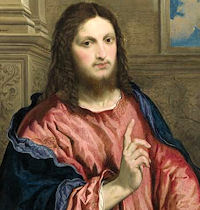Free eBook:

|
| Free eBook: Liturgical Year 2023-2024, Vol. 4 |
» Enjoy our Liturgical Seasons series of e-books!
"As they were going along the road, a man said to him, "I will follow you wherever you go." And Jesus said to him, 'Foxes have holes, and birds of the air have nests; but the Son of man has nowhere to lay his head (Luke 9:57-58).'" Today, Jesus calls us to follow him as he makes his way toward Jerusalem, where the mystery of death and rebirth is to be accomplished to follow these requires wholehearted commitment, the commitment of love. Nothing less is fit for the reign of God.
The Optional Memorial of St. Cyril of Alexandria is superseded by the Sunday liturgy.
Doing God's Will Is True Freedom
In the second reading, St. Paul tells the Galatians that they were called for freedom. He then makes an important distinction that needs to be reiterated often in our world, and that is the distinction between freedom and license. St. Paul says "do not use your freedom as an opportunity for the flesh; rather, serve one another through love." Many people seem to have the idea that freedom is all about doing what I want, when I want, how I want, etc. This is not freedom, but license. License is selfish, the opposite of the love to which St. Paul exhorts us.
The problem is that most people do not know what true freedom is. True freedom is found in doing God's will. This may strike us as sounding like a contradiction because we have the idea that doing the will of another is slavery, not freedom. There are two important differences: First, God does not force us to do His will, rather, we must choose to do His will and, second, He only wants what is the very best for us. Because God only wants the best for us, the better we do His will, the greater will be the freedom that is ours. The opposite is also true: The further we stray from His will, the more we are enslaved to things that violate our dignity. This is why St. Paul tells us to live according to the Spirit rather than the flesh. The former brings freedom and life while the latter brings slavery and death.
When we consider our Lord's words in the Gospel reading, it would seem that God's ways are harsh and even mean. After all, the two people asked good and legitimate things: to bury the dead and to kiss the family farewell. However, when we look at the context of the first reading, we will see that what the Lord is saying is not what it might seem to be on the surface.
The man in the Gospel asks for essentially the same favor asked by Elisha in the first reading: to kiss his parents goodbye. Elijah allows Elisha to go to his parents. Jesus, on the other hand, tells the man that anyone who puts his hand to the plow and looks to what is left behind is not fit for the Kingdom of God.
What appear to be two contradictory courses of action are really the same when we find that Elisha slaughtered the oxen, burned the yokes to cook the meat, and fed his family with the meat from the oxen. In performing these actions, the Prophet effectively cut off any possibility of returning to his former way of life. The words of Jesus are a play on what Elisha did when he took his hands off the plow in his field and put his hands to the plow in the Lord's field.
This same thing has to happen with each of us. So many people keep looking back at some past sin or at other circumstances wondering about what might have been. Sometimes married people wonder what it would have been like as a priest or a nun or, even worse, what it would have been like if they had married another person. Priests and religious fall into similar pitfalls. These are all temptations. Once we have put our hands to the plow of doing God's will in a vocation or some other work within our vocation, we cannot look back. We have to simply look at the Lord and seek to discern His will as we continue to move forward. This is true in all aspects of our lives. Unless we are looking back to reminisce or to pull up a lesson learned, it is useless and, sometimes, even harmful to look backward.
In the case of the man in the Gospel who wanted to follow Jesus but only after he buried his father, the problem is putting off seeking or doing the will of God. Who knows how long his father may have lived. The Lord was calling the man now; he was willing to follow on his own terms and at some time in the future. It cannot be so with us. We need to earnestly seek the will of God for us in general (vocation, direction for our life) but also in particular questions (what does God want of me today or in the immediate future?). In each situation in the readings, the people had free will and could exercise it. The same is always true for each of us. As we see in the Gospel, the Lord will not force us to do anything, but He does call us. We can use our free will to do whatever we wish, but we will only find true freedom when we choose to do the will of God.
— Fr. Robert Altier







